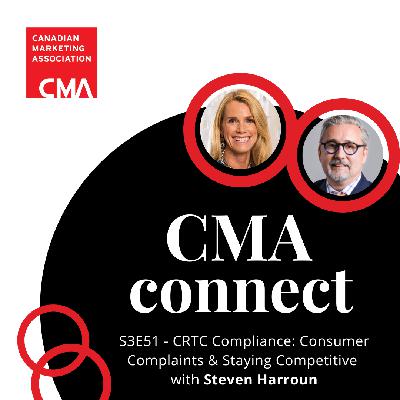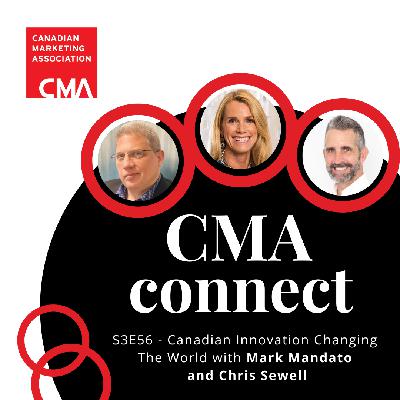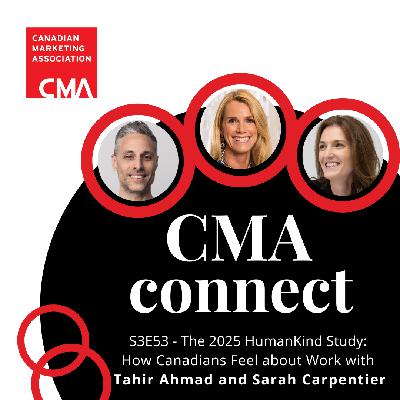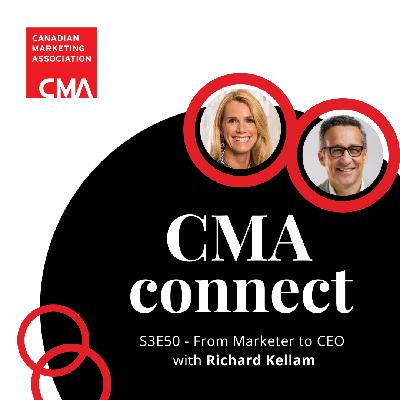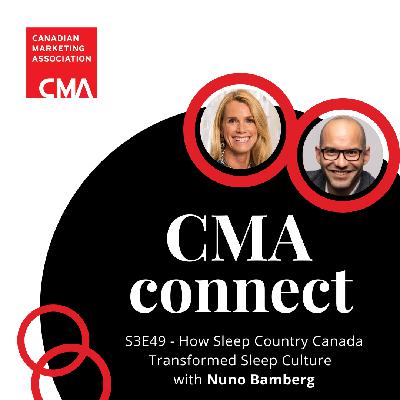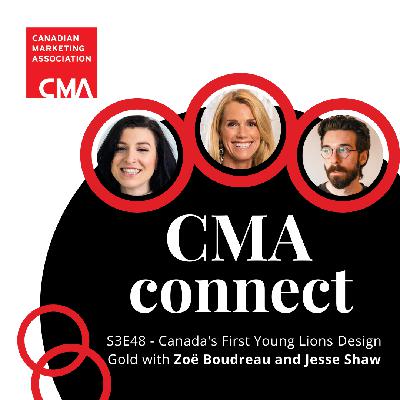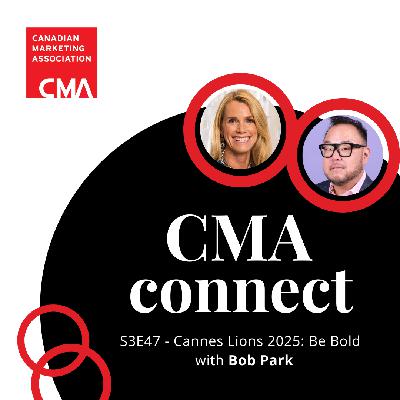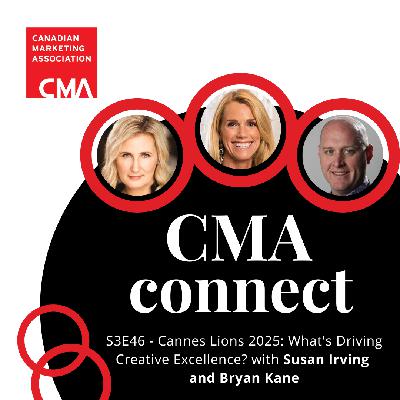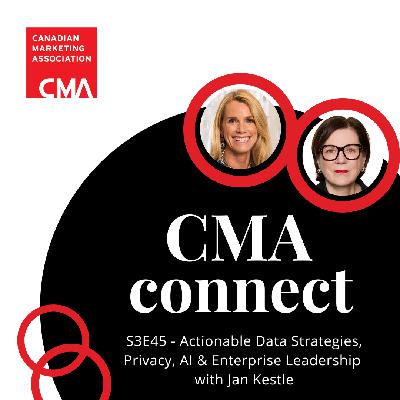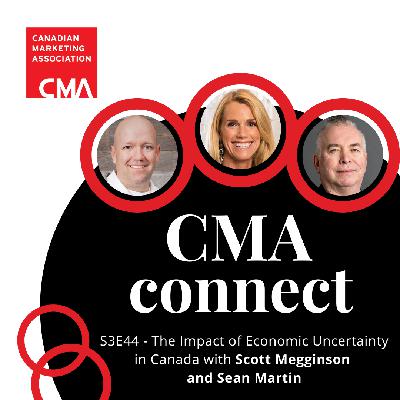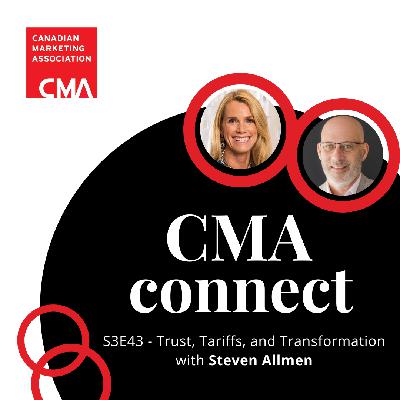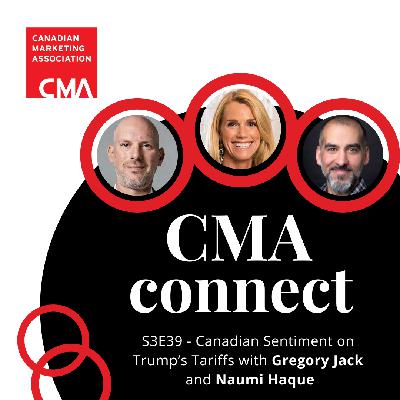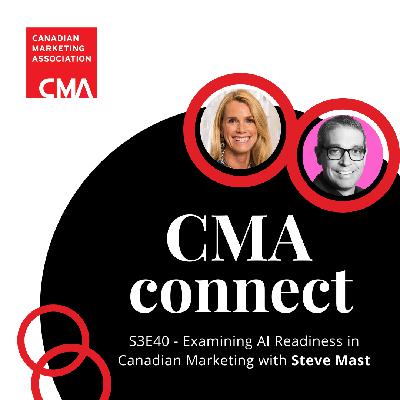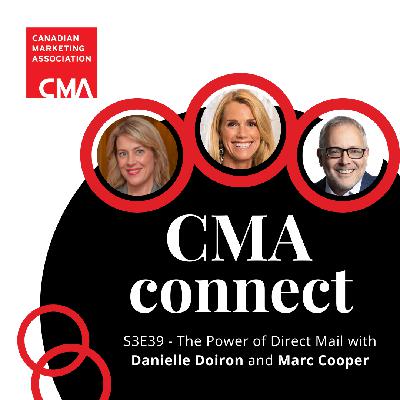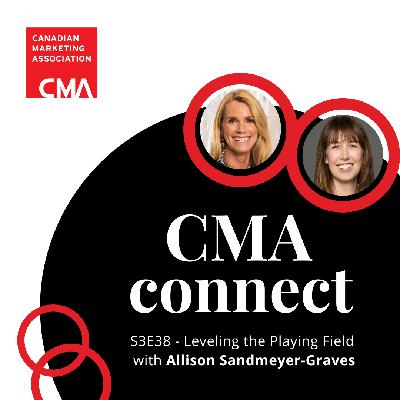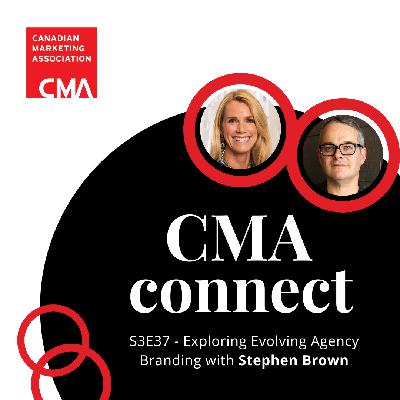EP51 - CRTC Compliance: Consumer Complaints & Staying Competitive with Steven Harroun
Description
Marketers have a lot to lose. With complaints surging, mistakes can lead to hefty fines while playing it safe can limit innovation and creativity. So what can they do? CMA CEO Alison Simpson sits down with Steven Harroun, Vice President, Compliance and Enforcement at the CRTC to see where the complaints are coming from, and share the strategies marketers use to stay both competitive and compliant.
00:00:01 :18 - 00:00:28 :05
Presenter
Welcome to CMA Connect, Canada's marketing podcast, where industry experts discuss how marketers must manage the tectonic shifts that will change how brands and businesses are built for tomorrow, while also delivering on today's business needs. With your host, CMA CEO, Alison Simpson.
00:00:28 :07 - 00:01:00 :20
Alison
It's my pleasure to welcome Steven Harroun, a regulatory leader whose expertise sits at the critical intersection of marketing compliance and consumer protection in Canada's digital landscape. As a Vice President, Compliance and Enforcement at the CRTC, Steven oversees the enforcement of laws and regulations that directly impact how Canadian marketers operate, including CASL, Canada Anti-Spam Legislation and the Unsolicited Telecommunication Rules, including the National Do Not Call list, which both shape the daily practices of marketing professionals in Canada.
00:01:00 :22 - 00:01:34 :13
Alison
While Steven's primary role focuses on regulatory enforcement, his unique position makes him an invaluable voice for marketers navigating Canada's complex compliance landscape. Steven and his team are highly valuable partners to the CMA. He has written articles for us addressing the practical challenges that marketers face when contacting Canadian consumers, while ensuring they're staying compliant with federal regulations. Steven's recent article "From CASL to unsolicited calls: Insights for marketers", really demonstrates his commitment to helping marketing professionals understand and adapt to evolving regulatory requirements.
00:01:34 :15 - 00:01:59 :06
Alison
Steven brings over two decades of experience in telecommunications policy and regulation, having joined the CRTC in 2002 after working at the Canada Revenue Agency and in the private sector. Through his work, Steven has developed international partnerships with regulators worldwide, creating memoranda of Understanding that help enforce Canadian marketing laws across borders, which is a critical capability in today's global digital marketing environment.
00:01:59 :08 - 00:02:05 :03
Alison
Steven, thanks so much for joining me today. I'm really looking forward to an engaging and insightful conversation.
00:02:05 :05 - 00:02:21 :22
Steven
Thank you Alison. That's probably too kind of an introduction, but I appreciate it. And I truly appreciate the invitation. Like, engagements like this are like one of the favourite parts of my role in the organization. And, if I could do one of these every day, I would. So, no, I look forward to the discussion.
00:02:21 :23 - 00:02:42 :23
Alison
Thank you. Now, Steven, the CMA and the CRTC have a long- standing, very collaborative relationship, from coauthoring thought leadership to working on key consumer choice initiatives. Building on that foundation of shared understanding, what do you see as the most important evolution in the dialog between regulators and the marketing community over the past few years?
00:02:43 :01 - 00:03:14 :12
Steven
Yeah, I, let me start with something probably your members already know. But the CRTC, you know, we're an independent quasi judicial administrative tribunal, right? So we regulate communications in Canada in the public interest. We hold public consultations on like telecommunications and broadcasting matters, and we make decisions based on a public record. Now, if you turn to my role at the CRTC, which is a little bit unique, and it is unique to kind of have an enforcement arm embedded within the communications regulator, and I was gonna say perhaps I'll get to tell you later about the advantages of that.
00:03:14 :14 - 00:03:33 :17
Steven
But, you know, I am responsible and accountable for promoting compliance, as you said, with Canada's anti=spam legislation in which we affectionately call CASL. And if you actually went to look at the real name of that legislation it's about 42 words long, so CASL works really well, as well as the unsolicited telecommunications roles, which includes our national Do Not Call list.
00:03:33 :17 - 00:03:50 :09
Steven
Right. So that's which is kind of probably a key piece, you know, for your members here. I'm super proud, and I, you know, I started this by saying, I appreciate the invitation, but I'm, I'm super proud of kind of the relationship that we have with industry and specifically the CMA, because I feel like it's very longstanding for me, which is great.
00:03:50 :09 - 00:04:09 :16
Steven
I think one of my first engagements when I stepped into this chair a few years ago was with the CMA. So I'm glad we've been able to continue this discussion, because educating on compliance, ensuring that marketers understand their obligations, take that bigger, just ensuring that all kind of legitimate companies in Canada understand the rules of the road, if you will.
00:04:09 :18 - 00:04:34 :05
Steven
That's key to the success rate. Compliance is key to my success. So at the end of the day, if the more and more outreach activities like this that we do and you're right, we've done vlogs, we're doing this, you know, maybe next year I'll get to do some in-person thing with you guys, perhaps something that's, on the radar. But it's actually these collaborations and these unique opportunities where I get to kind of, you know, talk about, well, this is the world as I see it today.
00:04:34 :10 - 00:04:57 :18
Steven
You know, and kind of the premise of your question was exactly that, like today. So I look back and I look back and, you know, I look back ten years and go, the things that we were seeing then and the complaints that we were seeing then from Canadians and the environment in which we're operating, we're very much focused on telemarketing and people getting calls and people, you know, I was going to say deciding whether or not they wanted to get calls right?
00:04:57 :19 - 00:05:20 :06
Steven
Now, ironically, you know, it's ten years since CASL came into force this year, just in July. So that dialog has changed, right? Even over, even with your organization over the past decade, that dialog has changed. We are now talking about not just about calls. We are now talking about emails, and we're talking about SMS and we're talking about other digital platforms, perhaps that we hadn't even contemplated the early days of CASL.
00:05:20 :11 - 00:05:41 :00
Steven
Right? We were talking about will you agree to get my email that's exploded kind of exponentially, even just from that, from that side of the house. So I think that's interesting to me, and I think that's fascinating as far as a landscape perspective goes, the legislation on the telemarketing side is 20 years old. You know, the even on CASL now, it's actually hard to believe for me to say that that's ten years old.
00:05:41 :02 - 00:06:01 :11
Steven
But the environment in which we, you know, we ensure compliance within those regimes has just changed dramatically. And I look at, from my organization and if I look at kind of how we're trying to approach that. We, and I'm sure and I'm sure we'll get into this discussion, like your members have had to totally change things up completely. Like we, in the last ten years
00:06:01 :11 - 00:06:17 :17
Steven
I built up a technical forensics team, you know, and I, you know, and I have a whole group of people now who, who slice and dice all the intelligence that we receive. But, you know, then we also have to look at when we're doing major investigations, we have to look at people's devices. And we have to understand, I was going to say, I'm no engineer, right?
00:06:17 :17 - 00:06:35 :02
Steven
I'm really lucky, or a techie engineer. I'm really lucky that I get to lead a really great team of really cool, really technical people. But they can look at all this coding and they can look, you know, behind the screen and they can tell me like, oh, this is happening and this is where this is and this, which, which fascinates me.
00:06:35 :02 - 00:06:53 :18
Steven
And if you told me ten years ago I'd lead a team of forensics experts, I would have, I would have said, I must be changing jobs, but I'm not, because that's just how much the environment has changed which I think it's really cool. But then I, you know, if I go to where your members are sitting and the things that they need to do, it isn't just calling Canadians about something, right?
00:06:53 :18 - 00:07:09 :19
Steven
It's how are we reaching Canadians on so many different levels in so many different platforms? And most importantly for me, because I go back to my compliance roots, is how are we respecting Canadians' choices? Like how are we respect, like this is how I want to be engaged, and this is how often I want to be engaged. And you know what?
00:07:09 :22 - 00:07:26 :11
Steven
I don't want to be engaged anymore. Right? Like that's the other side of that. So I, you know, it's easy for me to sit here as, you know, the Vice President of Compliance and Enforcement and say, do this, do this, do this and respect this, respect this, respect this. But I also, I understand, I was gonna say I worked in private sector at the early start in my career.<

